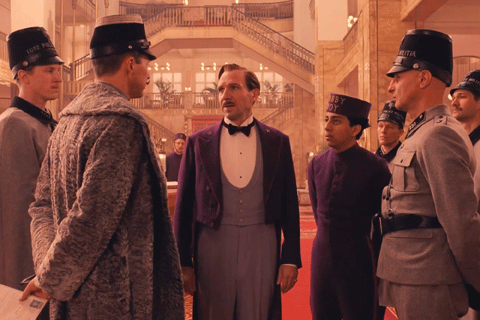 CALL THE FRONT DESK In The Grand Budapest Hotel, Ralph Fiennes is dapper concierge M. Gustave. |
It is, by now, axiomatic to remark upon the similarity Wes Anderson’s films bear to a child’s dollhouse. His name conjures the dioramic sets of The Royal Tenenbaums and The Life Aquatic with Steve Zissou, the delicately rendered miniatures of Fantastic Mr. Fox, and the uniform wardrobes on display throughout his eight features. One seems to favor some of his films over others based upon how much Anderson allows his major characters to act out against his exquisitely designed, emotionally controlled environments: do we react more strongly to the adolescent fervor of a Max Fischer or the porcelain delicacy of a Margot Tenenbaum? Anderson’s protagonists are mostly young and struggling to achieve the elusive peace, maturity, or confidence associated with adulthood. His collected films openly debate whether it is more harrowing to be trapped in a dollhouse, or to simply to want to blow the dollhouse up.
The Grand Budapest Hotel, set largely in the run-up to World War II, complicates this equation: the film’s eponymous dollhouse doesn’t crumble into ruins, but it does fall victim to the heinous force of brutalist architecture. (Is this Anderson’s most fearsome villain?) History, rather than ennui, is the incursion that motivates this, his most antic and most somber work. We begin in the relative present in a fictional country called Zubrowka and work backwards; the film is structured like a nesting doll, where each figure contains the burdens and memories of a previous generation.
After meeting older incarnations of two major characters — one has written a beloved book about the hotel, which struggles to maintain its opulence under a concrete shell and Soviet color scheme in the 1960s — we arrive in 1932, where the bulk of the film is set. The hotel is at the peak of its success under the watchful eyes of M. Gustave (Ralph Fiennes), a dapper concierge with an eye always on the unforeseen desires of his guests. In particular, he elicits and responds to the sexual desires of wealthy, elderly visitors, including Madame D. (Tilda Swinton), who turns up dead while Gustave is in the process of indoctrinating a new lobby boy, Zero Moustafa (Tony Revolori).
Madame D.’s death is the inciting incident of the film, and the narrative that unfurls in its aftermath is the most efficient, irrelevant, and elaborate that Anderson has conceived. Adventures ensue on trains, motorcycles, funiculars, and skis. Pertinent characters include an accountant with a Persian cat in his arms, a villain wearing brass knuckles, and a baker with a birthmark shaped like Mexico. The narrative’s scant pauses are for M. Gustave to liberally spritz his favorite scent (L’air de Panache), or to recite a stanza or two of Romantic poetry. The story’s major punctuation marks, though, are a series of abrupt, brutal, funny acts of violence.